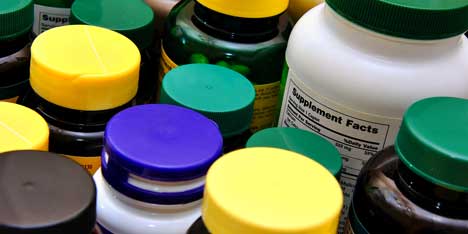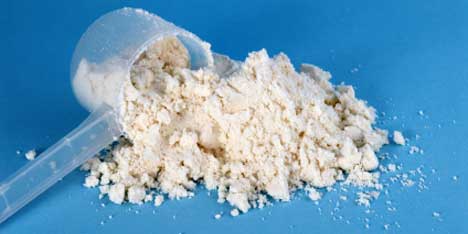Supplements
After applying yourself to training, diet, and sleep, what else can you do to help build your new body?
When you walk into a fitness supplement store, you will be presented with hundreds of jars and bottles, with colorful labels and some pretty wild promises. But is everything what it seems? Or is it all just slick marketing hype?
After applying yourself to training, diet, and sleep, what else can you do to help build your new body?
When you walk into a fitness supplement store, you will be presented with hundreds of jars and bottles, with colorful labels and some pretty wild promises. But is everything what it seems? Or is it all just slick marketing hype?
Patented Formulas
Over years, bodybuilders and other muscle building athletes have found that only a few supplements really work. And none of them are patented. They are single-ingredient substances that occur normally in our food, just in a concentrated form.
Heavily marketed, fancy named, patented formulas either don't work, or they are simply based on well known substances that can be found much more cheaply in their generic form.
To keep your life simple, and save your cash, pass by the hyped-up compounds, and stick with the basic, tried and trusted single ingredient supplements. You can't beat them.
Over years, bodybuilders and other muscle building athletes have found that only a few supplements really work. And none of them are patented. They are single-ingredient substances that occur normally in our food, just in a concentrated form.
Heavily marketed, fancy named, patented formulas either don't work, or they are simply based on well known substances that can be found much more cheaply in their generic form.
To keep your life simple, and save your cash, pass by the hyped-up compounds, and stick with the basic, tried and trusted single ingredient supplements. You can't beat them.
Whey Protein
Whey Protein is a staple. Protein is the building block of muscle, and as you exercise your muscle, the body needs more protein than usual. Depending on the intensity of your muscle building program, you need between 1.5 and 2 grams of protein per pound of lean body weight. You should get most of your protein from nutrient rich foods, such as meat, eggs, and beans. But at this level of protein intake, you would be eating constantly. Powdered protein can be used to reach your protein target, by supplementation between meals.
Although other kinds of protein supplements are available, whey protein is the most effective. It is a complete protein, easy to digest, and available in a variety of flavors.
There are three forms of whey protein, and some brands contain a blend of these.
- Whey Protein Concentrate contains lactose, so it is unsuitable for those who are sensitive to it. Lactose is a carbohydrate, so if you are restricting your carbohydrate intake, keep an eye on it. It is usually only 80% protein by weight, the rest is carbohydrate. Whey Protein Concentrate is a good all-purpose protein supplement, and relatively cheap.
- Whey Protein Isolate has the lactose removed. It has no carbs and is usually more than 90% protein by weight. Whey Protein Isolate is also a good all-purpose protein supplement, but a little more expensive.
- Hydrolized Whey Protein is predigested, and as such is more rapidly absorbed that other forms of whey protein. This is a good choice immediately after, or during a workout. Not the best directly before bedtime. Hydrolyzed Whey Protein is the most expensive of these three forms.

L-Glutamine
L-glutamine is an amino acid. That means that it is a building block of protein. Normally, it is non-essential. That means that the body can synthesize all the glutamine it needs. However, then the body is in a catabolic state, for example after a heavy workout, or during calorie restricted dieting, it becomes essential. That means that under these conditions, the body can’t make (enough of) it, and supplementation is a good idea. L-glutamine helps recovery and preserve lean muscle mass. There is some evidence that l-glutamine also helps the gastrointestinal system and the immune system.
You can buy l-glutamine in capsules, but to get a full 5 gram serving, you would need to take 3-10 capsules. The powder is much cheaper. A tablespoon full is about 5 gram. You can mix it into a drink, or just put it into your mouth and wash it down with a full glass of water.
When to take and how much: take one tablespoon of L-Glutamine after your workout, and another before bed (the body is catabolic during sleep).

Creatine Monohydrate
Creatine monohydrate is an effective supplement for muscle gain. When you first start taking it, you will notice a considerable gain in muscle size, however that is only water. The real benefit of creatine is that it can increase maximum power, so you can work out more intensely. Creatine will also help muscle repair after a heavy workout.
Creatine ethyl ester is another form of creatine that was popular a while ago, but it's effectiveness is in doubt.
When to take and how much: take one tablespoon of Creatine Monohydrate before your workout. Consume a moderate amount of high glycemic carbohydrates with it, such as glucose tablets, or honey or sugar.
Fish Oil / Flax Seed Oil
Fish oil and flax seed oil are packed with omega-3 fatty acids. This lowers "bad" cholesterol (LDL), increases your level of "good" cholesterol (HDL), and reduces your chance of heart disease.
This supplement is especially important for people who haver a diet high in meat, because meat can increase your "bad" cholesterol. Of course, if you eat a lot of fish already, you don't need to supplement.
You need about 3 grams of omega-3 fatty acids per day. Concentrations vary, but on average that is 12 grams of fish oil (a full tablespoon), or 6 grams of flax seed oil (half a tablespoon).
Fish and flax seed oil is available as plain oil and in capsules. You might think that capsules are more convenient, but they are not. You would need to take about a dozen capsules to get the daily amount.
Taking a spoonful of oil straight up is probably the easiest. If you don't like the aftertaste, wash it down with fruit juice. You can also add the oil to cold food, for example in a salad dressing. But the oil must not be heated, so never use it in cooking.
When to take and how much: take one tablespoon of fish oil, or half a tablespoon of flax seed oil daily, at any time.
Summary
- Before workout: take one tablespoon of creatine
- After workout: take one tablespoon of l-glutamine, and consume a protein shake with two scoops of fast absorbing hydrolized whey
- Before bed: one tablespoon of l-glutamine, and a protein shake with two scoops of slow absorbing protein, such as whey concentrate or isolate
- Any time: one tablespoon of fish or flax seed oil
